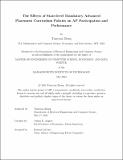| dc.contributor.advisor | Angrist, Joshua D. | |
| dc.contributor.author | Zheng, Tianyuan | |
| dc.date.accessioned | 2024-09-16T13:51:57Z | |
| dc.date.available | 2024-09-16T13:51:57Z | |
| dc.date.issued | 2024-05 | |
| dc.date.submitted | 2024-07-11T14:36:52.185Z | |
| dc.identifier.uri | https://hdl.handle.net/1721.1/156834 | |
| dc.description.abstract | AP (Advanced Placement) courses allow high school students to earn college credits. While the AP program aims to broaden educational opportunities for a diverse student body across the U.S., disparities in the availability and participation rates of AP courses may exacerbate inequality. To address this, some states require all high schools to offer at least one AP course. This study analyzes the impacts of AP mandates using difference-in-differences models. My findings indicate that school-level AP mandates are associated with a 36% increase in the number of public schools offering AP. I find little evidence, however, that these mandates significantly increase student AP participation. Furthermore, they decrease AP credit attainment rate by 11% conditioned on students taking AP exams. | |
| dc.publisher | Massachusetts Institute of Technology | |
| dc.rights | In Copyright - Educational Use Permitted | |
| dc.rights | Copyright retained by author(s) | |
| dc.rights.uri | https://rightsstatements.org/page/InC-EDU/1.0/ | |
| dc.title | The Effects of State-level Mandatory Advanced Placement Curriculum Policies on AP Participation and Performance | |
| dc.type | Thesis | |
| dc.description.degree | MNG | |
| dc.contributor.department | Massachusetts Institute of Technology. Department of Electrical Engineering and Computer Science | |
| dc.identifier.orcid | 0000-0002-6882-5127 | |
| mit.thesis.degree | Master | |
| thesis.degree.name | | |
